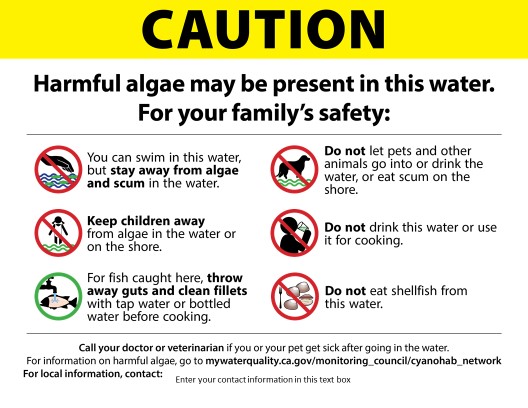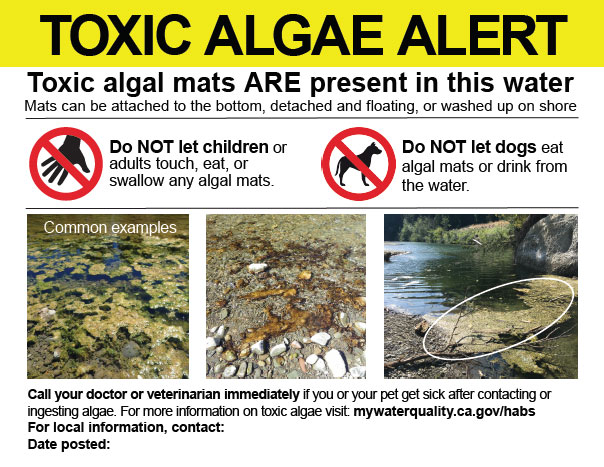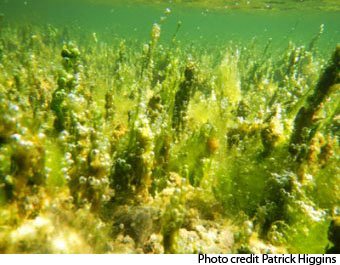Outreach and Resources for Freshwater HABs in Recreational Waters
Cyanobacteria (also known as blue-green algae) are non-pathogenic, photosynthetic bacteria that commonly grow in freshwater lakes, reservoirs, rivers and streams, and estuaries. Cyanobacteria can quickly multiply into a harmful algal bloom (HAB) under the right environmental conditions. While many HABs are caused by algae or cyanobacteria that grow suspended in the water column (planktonic), some algae grow attached to rocks, sediment, or other materials along the bottom (benthic) of the water body and can form algal mats.

Many cyanobacteria can produce toxins, which are collectively referred to as cyanotoxins. Several cyanotoxins are extremely toxic to laboratory animals and have poisoned people.
People swimming, waterskiing, or boating in these water bodies can be exposed to cyanotoxins through skin contact, accidentally swallowing water, or inhaling aerosols.
People exposed to cyanotoxins in recreational waters may experience eye irritation, skin irritation or rash, vomiting, diarrhea, and cold and flu-like symptoms. Ongoing daily exposures can lead to more serious effects.
Dogs playing in or near recreational waters have died after drinking scummy water or eating algae with high levels of cyanotoxins.
The Interagency HAB-related Illness Workgroup investigates and tracks potentially HAB-related illnesses in humans and animals throughout California.
OEHHA HABs Program led or contributed to the following outreach and resources:
California HAB Response and Illness Tracking Presentation at 2023 US EPA CyanoSymposium (PDF of slides and recording)
California Water: Assessment of Toxins for Community Health (Cal-WATCH) Project examines how HABs impact drinking water systems
OEHHA HAB staff co-authored scientific articles based on findings from the Cal-WATCH Project
Microcystins at the tap: A closer look at unregulated drinking water contaminants (2023), published in the American Water Works Association Journal of Water Science
Notes from the Field: Harmful Algal Bloom Affecting Private Drinking Water Intakes - Clear Lake, California, June - November 2021 (2022), published in the CDC’s Morbidity and Mortality Weekly Report
HABs and livestock article in CDFA Animal Health Branch newsletter, April 2022
Cyanotoxins In California's Fish And Shellfish Presentation (PDF) at US EPA Webinar: Occurrence and Effects of HAB on Fish and Shellfish, March 22, 2022
Synthesis of ecotoxicological studies on cyanotoxins in freshwater habitats (Mehinto et al. 2021)
OEHHA, as part of the Benthic HAB Subcommittee, contributed to the development of signs (general awareness and trigger level) and posting guidelines for benthic cyanobacteria, also referred to as toxic algal mats. These resources were reviewed and adopted for use by the CCHAB Network in 2020.
Keeping your dog safe from harmful algal blooms article in the Fall 2018 issue of California Waterfowl Magazine

In 2012, OEHHA evaluated the potential health risks and identified recreational water Action Levels* for three cyanotoxins commonly found in California: microcystins, anatoxin-a, and cylindrospermopsin. When toxins are found at concentrations above these Action Levels, a public health response is recommended, such as continued monitoring or issuance of public health advisories and posting signage. OEHHA worked with the California Cyanobacteria and Harmful Algal Bloom (CCHAB) Network to incorporate the Action Levels into Advisory Signs and Posting Guidance for Planktonic HABs. [*These Action Levels are provided as guidance thresholds and are not regulatory standards.]
For More Information, contact OEHHA HABs Program
916-324-7572; habs@oehha.ca.gov
Additional Resources
Fish, Incident Response, Seafood Safety, and Harmful Algal Bloom Section
Sacramento Office
1001 I Street
Sacramento, CA 95814
Phone: (916) 324-7572
habs@oehha.ca.gov


